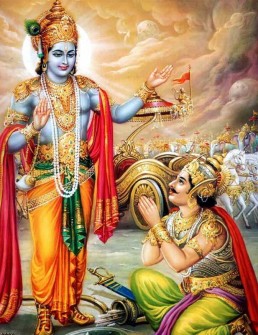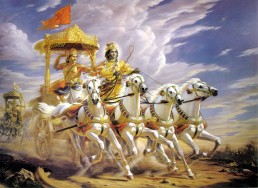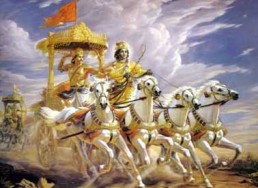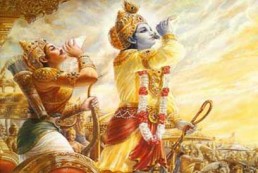Bhagavad Gita-Chapter 6 All Verses with Meaning and Audio
अनाश्रितः कर्मफलं कार्यं कर्म करोति यः ।
स संन्यासी च योगी च न निरग्निर्न चाक्रियः ॥ ६-१॥
anāśritaḥ karmaphalaṃ kāryaṃ karma karoti yaḥ
sa saṃnyāsī ca yogī ca na niragnirna cākriyaḥ 6-1
न ह्यसंन्यस्तसङ्कल्पो योगी भवति कश्चन ॥ ६-२॥
na hyasaṃnyastasaṅkalpo yogī bhavati kaścana 6-2
योगारूढस्य तस्यैव शमः कारणमुच्यते ॥ ६-३॥
yogārūḍhasya tasyaiva śamaḥ kāraṇamucyate 6-3
सर्वसङ्कल्पसंन्यासी योगारूढस्तदोच्यते ॥ ६-४॥
sarvasaṅkalpasaṃnyāsī yogārūḍhastadocyate 6-4
आत्मैव ह्यात्मनो बन्धुरात्मैव रिपुरात्मनः ॥ ६-५॥
ātmaiva hyātmano bandhurātmaiva ripurātmanaḥ 6-5
अनात्मनस्तु शत्रुत्वे वर्तेतात्मैव शत्रुवत् ॥ ६-६॥
anātmanastu śatrutve vartetātmaiva śatruvat 6-6
शीतोष्णसुखदुःखेषु तथा मानापमानयोः ॥ ६-७॥
śītoṣṇasukhaduḥkheṣu tathā mānāpamānayoḥ 6-7
युक्त इत्युच्यते योगी समलोष्टाश्मकाञ्चनः ॥ ६-८॥
yukta ityucyate yogī samaloṣṭāśmakāñcanaḥ 6-8
साधुष्वपि च पापेषु समबुद्धिर्विशिष्यते ॥ ६-९॥
sādhuṣvapi ca pāpeṣu samabuddhirviśiṣyate 6-9
एकाकी यतचित्तात्मा निराशीरपरिग्रहः ॥ ६-१०॥
ekākī yatacittātmā nirāśīraparigrahaḥ 6-10
नात्युच्छ्रितं नातिनीचं चैलाजिनकुशोत्तरम् ॥ ६-११॥
nātyucchritaṃ nātinīcaṃ cailājinakuśottaram 6-11
उपविश्यासने युञ्ज्याद्योगमात्मविशुद्धये ॥ ६-१२॥
upaviśyāsane yuñjyādyogamātmaviśuddhaye 6-12
सम्प्रेक्ष्य नासिकाग्रं स्वं दिशश्चानवलोकयन् ॥ ६-१३॥
samprekṣya nāsikāgraṃ svaṃ diśaścānavalokayan 6-13
मनः संयम्य मच्चित्तो युक्त आसीत मत्परः ॥ ६-१४॥
manaḥ saṃyamya maccitto yukta āsīta matparaḥ 6-14
शान्तिं निर्वाणपरमां मत्संस्थामधिगच्छति ॥ ६-१५॥
śāntiṃ nirvāṇaparamāṃ matsaṃsthāmadhigacchati 6-15
न चातिस्वप्नशीलस्य जाग्रतो नैव चार्जुन ॥ ६-१६॥
na cātisvapnaśīlasya jāgrato naiva cārjuna 6-16
युक्तस्वप्नावबोधस्य योगो भवति दुःखहा ॥ ६-१७॥
yuktasvapnāvabodhasya yogo bhavati duḥkhahā 6-17
निःस्पृहः सर्वकामेभ्यो युक्त इत्युच्यते तदा ॥ ६-१८॥
niḥspṛhaḥ sarvakāmebhyo yukta ityucyate tadā 6-18
योगिनो यतचित्तस्य युञ्जतो योगमात्मनः ॥ ६-१९॥
yogino yatacittasya yuñjato yogamātmanaḥ 6-19
यत्र चैवात्मनात्मानं पश्यन्नात्मनि तुष्यति ॥ ६-२०॥
yatra caivātmanātmānaṃ paśyannātmani tuṣyati 6-20
वेत्ति यत्र न चैवायं स्थितश्चलति तत्त्वतः ॥ ६-२१॥
vetti yatra na caivāyaṃ sthitaścalati tattvataḥ 6-21
यस्मिन्स्थितो न दुःखेन गुरुणापि विचाल्यते ॥ ६-२२॥
yasminsthito na duḥkhena guruṇāpi vicālyate 6-22
स निश्चयेन योक्तव्यो योगोऽनिर्विण्णचेतसा ॥ ६-२३॥
sa niścayena yoktavyo yogo’nirviṇṇacetasā 6-23
मनसैवेन्द्रियग्रामं विनियम्य समन्ततः ॥ ६-२४॥
manasaivendriyagrāmaṃ viniyamya samantataḥ 6-24
आत्मसंस्थं मनः कृत्वा न किञ्चिदपि चिन्तयेत् ॥ ६-२५॥
ātmasaṃsthaṃ manaḥ kṛtvā na kiñcidapi cintayet 6-25
ततस्ततो नियम्यैतदात्मन्येव वशं नयेत् ॥ ६-२६॥
tatastato niyamyaitadātmanyeva vaśaṃ nayet 6-26
उपैति शान्तरजसं ब्रह्मभूतमकल्मषम् ॥ ६-२७॥
upaiti śāntarajasaṃ brahmabhūtamakalmaṣam 6-27
सुखेन ब्रह्मसंस्पर्शमत्यन्तं सुखमश्नुते ॥ ६-२८॥
sukhena brahmasaṃsparśamatyantaṃ sukhamaśnute 6-28
ईक्षते योगयुक्तात्मा सर्वत्र समदर्शनः ॥ ६-२९॥
īkṣate yogayuktātmā sarvatra samadarśanaḥ 6-29
तस्याहं न प्रणश्यामि स च मे न प्रणश्यति ॥ ६-३०॥
tasyāhaṃ na praṇaśyāmi sa ca me na praṇaśyati 6-30
सर्वथा वर्तमानोऽपि स योगी मयि वर्तते ॥ ६-३१॥
sarvathā vartamāno’pi sa yogī mayi vartate 6-31
सुखं वा यदि वा दुःखं स योगी परमो मतः ॥ ६-३२॥
sukhaṃ vā yadi vā duḥkhaṃ sa yogī paramo mataḥ 6-32
योऽयं योगस्त्वया प्रोक्तः साम्येन मधुसूदन ।
एतस्याहं न पश्यामि चञ्चलत्वात्स्थितिं स्थिराम् ॥ ६-३३॥
yo’yaṃ yogastvayā proktaḥ sāmyena madhusūdana
etasyāhaṃ na paśyāmi cañcalatvātsthitiṃ sthirām 6-33
तस्याहं निग्रहं मन्ये वायोरिव सुदुष्करम् ॥ ६-३४॥
tasyāhaṃ nigrahaṃ manye vāyoriva suduṣkaram 6-34
असंशयं महाबाहो मनो दुर्निग्रहं चलम् ।
अभ्यासेन तु कौन्तेय वैराग्येण च गृह्यते ॥ ६-३५॥
asaṃśayaṃ mahābāho mano durnigrahaṃ calam
abhyāsena tu kaunteya vairāgyeṇa ca gṛhyate 6-35
वश्यात्मना तु यतता शक्योऽवाप्तुमुपायतः ॥ ६-३६॥
vaśyātmanā tu yatatā śakyo’vāptumupāyataḥ 6-36
अयतिः श्रद्धयोपेतो योगाच्चलितमानसः ।
अप्राप्य योगसंसिद्धिं कां गतिं कृष्ण गच्छति ॥ ६-३७॥
ayatiḥ śraddhayopeto yogāccalitamānasaḥ
aprāpya yogasaṃsiddhiṃ kāṃ gatiṃ kṛṣṇa gacchati 6-37
अप्रतिष्ठो महाबाहो विमूढो ब्रह्मणः पथि ॥ ६-३८॥
apratiṣṭho mahābāho vimūḍho brahmaṇaḥ pathi 6-38
त्वदन्यः संशयस्यास्य छेत्ता न ह्युपपद्यते ॥ ६-३९॥
tvadanyaḥ saṃśayasyāsya chettā na hyupapadyate 6-39
पार्थ नैवेह नामुत्र विनाशस्तस्य विद्यते ।
न हि कल्याणकृत्कश्चिद् दुर्गतिं तात गच्छति ॥ ६-४०॥
pārtha naiveha nāmutra vināśastasya vidyate
na hi kalyāṇakṛtkaścid durgatiṃ tāta gacchati 6-40
शुचीनां श्रीमतां गेहे योगभ्रष्टोऽभिजायते ॥ ६-४१॥
śucīnāṃ śrīmatāṃ gehe yogabhraṣṭo’bhijāyate 6-41
एतद्धि दुर्लभतरं लोके जन्म यदीदृशम् ॥ ६-४२॥
etaddhi durlabhataraṃ loke janma yadīdṛśam 6-42
यतते च ततो भूयः संसिद्धौ कुरुनन्दन ॥ ६-४३॥
yatate ca tato bhūyaḥ saṃsiddhau kurunandana 6-43
जिज्ञासुरपि योगस्य शब्दब्रह्मातिवर्तते ॥ ६-४४॥
jijñāsurapi yogasya śabdabrahmātivartate 6-44
अनेकजन्मसंसिद्धस्ततो याति परां गतिम् ॥ ६-४५॥
anekajanmasaṃsiddhas tato yāti parāṃ gatim 6-45
कर्मिभ्यश्चाधिको योगी तस्माद्योगी भवार्जुन ॥ ६-४६॥
karmibhyaścādhiko yogī tasmādyogī bhavārjuna 6-46
श्रद्धावान्भजते यो मां स मे युक्ततमो मतः ॥ ६-४७॥
ॐ तत्सदिति श्रीमद्भगवद्गीतासूपनिषत्सु
ब्रह्मविद्यायां योगशास्त्रे श्रीकृष्णार्जुनसंवादे
आत्मसंयमयोगो नाम षष्ठोऽध्यायः ॥ ६॥
śraddhāvānbhajate yo māṃ sa me yuktatamo mataḥ 6-47
oṃ tatsaditi śrīmadbhagavadgītāsūpaniṣatsu
brahmavidyāyāṃ yogaśāstre śrīkṛṣṇārjunasaṃvāde
ātmasaṃyamayogo nāma ṣaṣṭho’dhyāyaḥ 6

Description
Bhagavad Gita Chapter 6 Summary
Dhyana-yoga – The Science of Self Realization
This chapter provides practical methods of meditation for one who has purified the mind by diligently engaging in karma-yoga described in the previous chapters. For such a seeker, a life of contemplation is suggested along with an assurance that the path of meditation inevitably leads to the ultimate goal of Realization whether it be in the current life or a future one. Below are the main themes of Chapter 6:
Verses 1 – 9, 16, 17
Bahiraṅga-sādhanā
Verses 10 – 15
Antaraṅga-sādhanā
Verses 18 – 32
Arjuna’s change of mind, leading to attachment (rāga)
Verses 33 – 36
Dhyāna-pratibandha and parihāra
Verses 37 – 45
Yogabhraṣṭa
Verses 46 – 47
Yogistuti (Praise of the yogī)
Gita Chapter 6 – Commentary by Swami Paramarthananda
Background
Lord Krishna introduced the topic of meditation towards the end of the last chapter. Being an important topic, Krishna spends almost the whole of this chapter dealing with meditation. [Here, meditation is upon the Lord as the very Self (Ātmā) of the meditator. This is meant to assimilate the Self-knowledge gained from the guru’s teaching. The conditioning that “I am the body” will go only with the assimilation of the Self-knowledge. Assimilated Self-knowledge alone can express as ānanda.]
Krishna talks about five important topics on meditation. They are:
1. Bahiraṅga-sādhanā — Those disciplines to be followed throughout daily life which influence one’s meditation.
2. Antaraṅga-sādhanā — Those disciplines to be followed immediately before meditation.
3. Dhyāna-svarūpam — Nature of meditation.
4. Dhyāna-phalam — Result of meditation.
5. Dhyāna-pratibandha-parihārau — Obstacle and remedy.
Bahiraṅga-sādhanā
At the outset, the Lord indicates the role of karmayoga in meditation by praising the karmayogī (1, 2). Karmayoga, being a conscious way of life, helps one in getting self-control. It converts an extrovert mind into a contemplative mind. Once this is achieved, one should try to lead a quieter life, because active life becomes an obstacle to meditation (3). Total detachment is the characteristic of a contemplative mind (4).
Incidentally, Krishna highlights two important values viz. self-confidence and self-control. One who lacks these two finds himself to be an obstacle for any pursuit. On the other hand, one who enjoys the above two virtues finds himself to be supporting force in every field (5, 6). Soon he is established in the vision of the Ātmā, the vision of equality (7 to 9).
Krishna mentions a few other disciplines also, like moderation in eating, sleeping, working, and resting (16, 17).
Antaraṅga-sādhanā
The meditator has to choose a secluded, undisturbed place for meditation (10). In that spiritually and physically pure place, he has to fix the seat which is neither too high nor too low, neither too soft nor too hard (11). Holding the body, neck, and head erect, he has to fix the sight on the tip of his nose, as it were (i.e., the eyes are half-closed) (13). Next, the meditator should withdraw the mind and sense organs from all other activities. The breathing also should be maintained even (refer V-27). With a calm, withdrawn, undisturbed, tension-free, and one-pointed mind, the meditator should meditate upon the Lord, the Ātmā (12, 14).
Dhyāna-svarūpam and Phalam
Meditation is nothing but abidance of the withdrawn mind in the Ātmā (18). Having given up all desires and having restrained the senses through the mind, one should gradually bring back the mind with the help of the discriminative intellect, step by step. Once the mind is made to abide in the Ātmā, there should be no other thought (25). Though the mind may get distracted, one has to bring it back from the respective fields to one’s own Ātmā (26).
(All this presupposes a clear understanding of Vedānta. Everything, including thoughts, is an object of the Ātmā, the Awareness. The Ātmā is not an object for me to be thought of, or to be experienced. It is the very “I”. Thus, to knock off all expectations and struggles and to abide as the Ātmā with the knowledge that “I am the Ātmā” is true meditation.)
Thus, constantly abiding in the Ātmā, the meditator comes to enjoy permanent peace which culminates in the attainment of liberation (videhamukti) (15). He enjoys an everabiding mind which is completely satisfied with the discovery of the Ātmā (20). Since his ānanda is not sensual, it transcends all the limits. Having discovered this inner fullness, he never loses sight of his true nature (21, 27, 28). Neither does he consider any other gain to be superior, nor is he shaken by even the greatest loss (22). This infinite ānanda will never be lost because this was never gained. It was veiled by the false notion that “I am sorrowful”. Once this is removed, the inner ānanda becomes evident. Thus, this is more a dissociation from sorrow rather than association (23). (This alone is known as jīvanmukti.) Seeing the Ātmā in all beings, and all beings in the Ātmā, he gets estabilshed in the vision of equality (29). This vision of the Ātmā alone is the vision of the Lord, because the Ātmā is not different from the Lord. Thus the meditator is ever established in the Lord inspite of his activities (30, 31). Being established in the Ātmā, he looks at all bodies including his body with the same attitude of detachment. Hence he is free from selfishness and is spontaneously established in dharma. He is a saint (32).
Dhyāna-pratibandha-parihārau
Now, Arjuna puts a question regarding an obstacle to meditation. It is the problem of mental restlessness or extrovertedness. Because of this, one finds it difficult to meditate and assimilate the Self-knowledge. This frustrates Arjuna’s mind and he asks for a solution (33, 34).
Krishna gives two methods to solve this problem. They are detachment and practice. When the mind is extrovert because of desires, one has to remove it by seeing the futility of desires and their fulfillment. This is detachment. Even a detached mind can be restless because of past habits. This has to be gradually removed by consistent practice alone. Thus, mental discipline requires determination and patience (35, 36).
Still, Arjuna feels diffident and he, somehow, thinks that liberation is not possible in one life. He desperately asks Krishna—“What happens to that seeker who has fallen from meditation? Does he not perish like a scattered cloud?” (Arjuna feels that the meditator has no puṇya, because he has not done any karma. He has failed to achieve liberation also. Thus being deceived of puṇya and mokṣa, he must face an unfortunate future, according to Arjuna.) Not being able to accept this, Arjuna surrenders to Krishna seeking clarification (37 to 39).
Krishna consoles Arjuna by asserting that a spiritual seeker can never have a bad lot (40). The very meditation is a puṇyakarma capable of giving heaven and later an ideal birth for the continuation of the spiritual pursuit. The yogabhraṣṭa (one who has fallen from the path of spirituality) is reborn in a cultured, prosperous family, or may be, even in the family of a saint (41, 42).
Having got such a birth, he gets associated with the previous wisdom at a very early age (43). Irresistibly drawn by the past habits (saṃskāras), he find his spiritual urge suddenly growing from a small flame to a huge conflagration (44). Committing his entire life to the spiritual pursuit and supported by the saṃskāras of all the previous lives, he effortlessly fulfils his mission in life (45).
Krishna concludes this chapter by praising the meditator in general (46) and praising the meditator of Krishna–paramātmā (Brahmātman) in particular.
Gita 6th Chapter – Main Topics
1. Bahiraṅga-sādhanā: 1 to 9, 16, 17
2. Antaraṅga-sādhanā: 10 to 15
3. Dhyāna-svarūpam and dhyāna-phalam: 18 to 32
4. Dhyāna-pratibandha and parihāra: 33 to 36
5. Yogabhraṣṭa: 37 to 45
6. Yogistuti (Praise of the yogī): 46, 47
Since the main topic here is meditation, the chapter is called Dhyāna-yoga or Ātmasaṃyama-yoga (mastery of the mind).
Other Bhagavad Gita Shlokams
Bhagavad Gita
The Bhagavad Gita, or the Song of the Lord, is a dialogue between Krishna, an incarnation of Vishnu, and his friend and disciple, Arjuna. Composed of 701 Shlokas arranged in 18 chapters, the Gita is one of the best-known philosophical texts of…
Bhagavad Gita-Chapter 01 All Verses with Meaning and Audio
Bhagavad Gita Chapter 1 All Verses for easy chanting along with Audio and Meaning. Lyrics In English, Sanskrit, Hindi, Telugu, Tamil, Gujarati, Bengali and many more languages.
Bhagavad Gita-Chapter 02 All Verses with Meaning and Audio
Bhagavad Gita Chapter 2 All Verses for easy chanting along with Audio and Meaning. Lyrics In English, Sanskrit, Hindi, Telugu, Tamil, Gujarati, Bengali and many more languages.
Bhagavad Gita-Chapter 03 All Verses with Meaning and Audio
Bhagavad Gita Chapter 3 All Verses for easy chanting along with Audio and Meaning. Lyrics In English, Sanskrit, Hindi, Telugu, Tamil, Gujarati, Bengali and many more languages.
Bhagavad Gita-Chapter 04 All Verses with Meaning and Audio
Bhagavad Gita Chapter 4 All Verses for easy chanting along with Audio and Meaning. Lyrics In English, Sanskrit, Hindi, Telugu, Tamil, Gujarati, Bengali and many more languages.
Bhagavad Gita-Chapter 05 All Verses with Meaning and Audio
Bhagavad Gita Chapter 5 All Verses for easy chanting along with Audio and Meaning. Lyrics In English, Sanskrit, Hindi, Telugu, Tamil, Gujarati, Bengali and many more languages.
Bhagavad Gita-Chapter 07 All Verses with Meaning and Audio
Bhagavad Gita Chapter 7 All Verses for easy chanting along with Audio and Meaning. Lyrics In English, Sanskrit, Hindi, Telugu, Tamil, Gujarati, Bengali and many more languages.
Bhagavad Gita-Chapter 08 All Verses with Meaning and Audio
Bhagavad Gita Chapter 8 All Verses for easy chanting along with Audio and Meaning. Lyrics In English, Sanskrit, Hindi, Telugu, Tamil, Gujarati, Bengali and many more languages.
Bhagavad Gita-Chapter 09 All Verses with Meaning and Audio
Bhagavad Gita Chapter 9 All Verses for easy chanting along with Audio and Meaning. Lyrics In English, Sanskrit, Hindi, Telugu, Tamil, Gujarati, Bengali and many more languages.
Bhagavad Gita-Chapter 10 All Verses with Meaning and Audio
Bhagavad Gita Chapter 10 All Verses for easy chanting along with Audio and Meaning. Lyrics In English, Sanskrit, Hindi, Telugu, Tamil, Gujarati, Bengali and many more languages.
Bhagavad Gita-Chapter 11 All Verses with Meaning and Audio
Bhagavad Gita Chapter 11 All Verses for easy chanting along with Audio and Meaning. Lyrics In English, Sanskrit, Hindi, Telugu, Tamil, Gujarati, Bengali and many more languages.
Bhagavad Gita-Chapter 12 All Verses with Meaning and Audio
Bhagavad Gita Chapter 12 All Verses for easy chanting along with Audio and Meaning. Lyrics In English, Sanskrit, Hindi, Telugu, Tamil, Gujarati, Bengali and many more languages.
Bhagavad Gita-Chapter 13 All Verses with Meaning and Audio
Bhagavad Gita Chapter 13 All Verses for easy chanting along with Audio and Meaning. Lyrics In English, Sanskrit, Hindi, Telugu, Tamil, Gujarati, Bengali and many more languages.
Bhagavad Gita-Chapter 14 All Verses with Meaning and Audio
Bhagavad Gita Chapter 14 All Verses for easy chanting along with Audio and Meaning. Lyrics In English, Sanskrit, Hindi, Telugu, Tamil, Gujarati, Bengali and many more languages.
Bhagavad Gita-Chapter 15 All Verses with Meaning and Audio
Bhagavad Gita Chapter 15 All Verses for easy chanting along with Audio and Meaning. Lyrics In English, Sanskrit, Hindi, Telugu, Tamil, Gujarati, Bengali and many more languages.
Bhagavad Gita-Chapter 16 All Verses with Meaning and Audio
Bhagavad Gita Chapter 16 All Verses for easy chanting along with Audio and Meaning. Lyrics In English, Sanskrit, Hindi, Telugu, Tamil, Gujarati, Bengali and many more languages.
Bhagavad Gita-Chapter 17 All Verses with Meaning and Audio
Bhagavad Gita Chapter 17 All Verses for easy chanting along with Audio and Meaning. Lyrics In English, Sanskrit, Hindi, Telugu, Tamil, Gujarati, Bengali and many more languages.
Bhagavad Gita-Chapter 18 All Verses with Meaning and Audio
Bhagavad Gita Chapter 18 All Verses for easy chanting along with Audio and Meaning. Lyrics In English, Sanskrit, Hindi, Telugu, Tamil, Gujarati, Bengali and many more languages.
Gita Dhyanam
The Gītā Dhyānam, also called the Gītā Dhyāna or the Dhyāna Ślokas associated with the Gītā, is a 9-verse Sanskrit poem that has often been attached to the Bhagavad Gita, one of the most important scr
Bhagavad Gita-Chapter 6 All Verses with Meaning and Audio – Bhagavad Gita – Bhagavad Gita Chapter 6 All Verses Easy Chanting with Audio and Meaning, Lyrics



